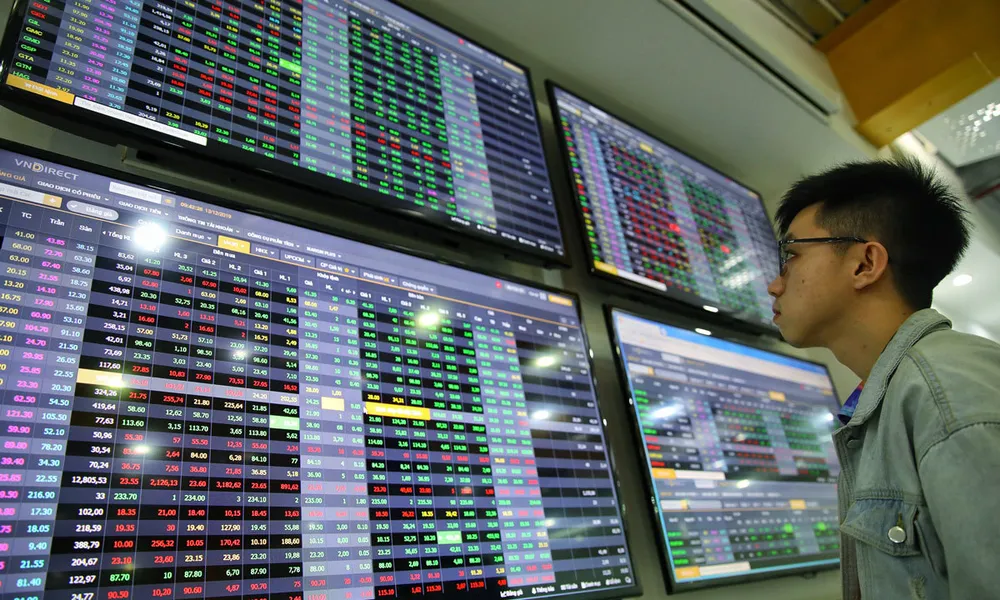
VN Index gain
The VN Index increased by about 28 percent from the lowest of low in November 2022 in the first half of 2023. In the first six months of the year, it was easy to see that the group of banking stocks did not have much to contribute to the overall increase of the market. However, from the beginning of July until now, the banking group has shown a different facade compared to the first months of the year.
Vietcombank (VCB) is currently the stock with the largest market capitalization on HoSE with more than VND 500,000 bln, accounting for nearly 11 percent of the total market capitalization. With this huge capitalization, VCB is considered the leading stock when continuously contributing a lot of points to the VN Index. For instance, in the trading session on 7 July, VCB increased by 4.3 percent to VND 105,000 and contributed to the VN Index by nearly 5.5 points. Thanks to the score from VCB, the VN Index ended the session with a gain of nearly 12 points.
In the next trading session, when VCB was sold out to take profit and fell slightly, another bank code BID (BIDV) took a strong position. BID is the 3rd largest market capitalization on HoSE with more than VND 250,000 bln accounting for around 5.4 percent. In this trading session, BID increased by 6 percent and contributed 3.67 points. At the trading session on 10 July, banking stocks also contributed quite significantly to the VN Index gain, including TCB (Techcombank) with 0.45 points, MBB (MBBank) with 0.35 points, and VPB (VPBank) with 0.35 points.
Although the market capitalization is only at the 9th position with VND 139,000 bln, VPB also has made a significant contribution to the VN Index. For instance, in the trading session on 18 July with an increase of 2.4 percent, VPB became the most active contributor to the VN Index with 1.22 points. Not only was the stock contributing the most to the score, but VPB also contributed the most to the liquidity of HoSE in this session with 37.3 million shares matched, equivalent to a trading value of nearly VND 777 bln.
From the above statistical data, it can be seen that the impact of banking stocks on the VN Index is undisputed. Recently, a foreign securities company, Maybank Investment Bank (MSVN) published an analysis report on the possibility of the VN Index reaching 1,300 points in 2023 with the main driving force being the banking stock group. Specifically in its report, MSVN maintains the P/E target for VN Index at 13.8x for a 5-year average and 0.5 standard deviation. Therefore, the target price of the VN Index in 2023 will decrease by 7 percent to 1,300 points, corresponding to an increase of nearly 15 percent compared to the current level.
Not only MSVN, but almost all securities companies have the same opinion about the importance of the banking group for the general market. Evidence can be obtained from the analysis report just published by Vietcombank Securities (VCBS). Accordingly, banking is still the industry group that accounts for the largest portion in terms of liquidity as well as market capitalization. Most banks still recorded relatively positive business results compared to the manufacturing sector in the first half of 2023.
Investing in stocks
Due to challenges from extremely slow economic growth both at home and abroad, banks set a target of decelerating profit growth in 2023. According to the business plan announced by banks at the Annual General Meeting (AGM), the target of 26 listed banks is to increase by only 13.5 percent compared to 2022. This is a low growth rate compared to the growth rate of 33.6 percent in 2022. Except for banks with high targets such as VPB and STB (Sacombank), the pre-tax profit of big banks only showed a target growth of 10.2 percent.
The fact that banks are cautious with the business target of 2023 is said to stem from concerns about asset quality showing signs of deterioration in recent quarters. This decline is due to factors such as slow economic growth, rapidly rising interest rates, high levels reducing the solvency of borrowers, the impact of economic slowdown in major economies, the weakening of the real estate market, and the impact of the corporate bonds market.
According to VCBS, the divergence of advantages and disadvantages of the banking group is expected to appear more clearly in the second half of 2023. Even profits will continue to have a strong divergence in 2024. At that time, some small-sized banks will continue to decelerate, even grow negatively in 2024. In case the real estate market and the world macro situation continue to deteriorate, causing credit to slow down and the customer's ability to repay to become difficult to recover, and the supporting circulars and policies expire. In contrast, banks that maintain a good credit balance despite the general economic difficulties facing the economy will be investment options with lower risks but will still provide acceptable returns in the second half of the year.
Mirae Asset Securities (MAS) set forth two main investment arguments when commenting on banking stocks in the second half of 2023. For a short-term investment strategy, MAS recommends that investors must focus on banking stocks with relatively attractive valuations with short-term catalysts such as private placement and resilience. For medium and long-term investment strategies, investors must choose banks with prudent business strategies and sustainable business results in recent years. The next choice would be a group of state-owned banks that offer many advantages in mobilizing and lending for businesses.




















